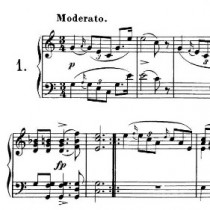At three Beth Levin fell in love with her first piano, an old Lester upright in the basement. She would go down for hours and create a little world for herself. Made her debut with the Philadelphia Orchestra at age 12, and performed with them again at 16. (Her teacher was the great Chopin interpreter, Maryan Filar.) On her first day as a pupil of Rudolf Serkin at the Curtis Institute, she roamed the halls of practice rooms wondering how anyone could practice for six hours. Her best moments have been as soloist with orchestras in Boston, New York, Philadelphia and Seattle, touring in Music From Marlboro and with chamber groups she has founded, most recently the American Arts Trio. She writes: “I live with my family in Brooklyn. I very much wanted children and was eager for the challenge of balancing a musical life with a home life. One of my favorite tasks is to pop a lasagna into the oven while doing some intense practicing, thereby fulfilling two roles at once — mother and musician.”
Beth Levin

A look at Schubert’s Sechs Moments Musicaux, Op. 94, D780
Our lilting introduction: a sweet opening in C major and in unison, as if arrived from nowhere.

A look at Schubert’s Sechs Moments Musicaux, Op. 94, D780
Our lilting introduction: a sweet opening in C major and in unison, as if arrived from nowhere.

Coffee! Now!
Coffee unites practice through rehearsal to performance. It promises lucidity. It delivers the imagination to unexplored regions.

Coffee! Now!
Coffee unites practice through rehearsal to performance. It promises lucidity. It delivers the imagination to unexplored regions.

Lachenmann / Nono / Schoenberg
The brilliant young group counter)induction performed a concert of Lachenmann, Nono and Schoenberg at the Italian Academy at Columbia University last night (March 4).

Lachenmann / Nono / Schoenberg
The brilliant young group counter)induction performed a concert of Lachenmann, Nono and Schoenberg at the Italian Academy at Columbia University last night (March 4).

Sublime Farewell: Beethoven’s Op. 111
Opening to the first page of the Henle edition of Sonata Op. 111. I realize how eager I am to get started, to crack the code and get inside.

Sublime Farewell: Beethoven’s Op. 111
Opening to the first page of the Henle edition of Sonata Op. 111. I realize how eager I am to get started, to crack the code and get inside.

Diabelli Days
Looking back on the Diabelli Variations after only five performances might seem premature.

Diabelli Days
Looking back on the Diabelli Variations after only five performances might seem premature.

From a Pianist’s Working Diary
Rehearsing and performing are different animals. Confidence comes easy in a warm living room, coffee and snacks on the table, humor abounding.

From a Pianist’s Working Diary
Rehearsing and performing are different animals. Confidence comes easy in a warm living room, coffee and snacks on the table, humor abounding.

From the Diary of an Indolent Pianist
The building’s vines have overgrown the window. My sandals languish by the piano.

From the Diary of an Indolent Pianist
The building’s vines have overgrown the window. My sandals languish by the piano.

Beethoven’s Diabelli Variations, Op. 120, Part 3.
Perhaps Beethoven is suggesting that Diabelli stole his theme from Mozart or is simply being a scamp.

Beethoven’s Diabelli Variations, Op. 120, Part 3.
Perhaps Beethoven is suggesting that Diabelli stole his theme from Mozart or is simply being a scamp.

Beethoven’s Diabelli Variations, Op. 120, Part 2.
The triplet as upbeat, reiterated in the middle voice and the bass, has a pulling effect to the downbeat made more powerful by each repetition.

Beethoven’s Diabelli Variations, Op. 120, Part 2.
The triplet as upbeat, reiterated in the middle voice and the bass, has a pulling effect to the downbeat made more powerful by each repetition.

Beethoven’s Diabelli Variations, Op. 120, Part 1.
The music expands quickly from piano to forte with pointed bass notes and a dashing sforzando at the second beat of measure 3.

Beethoven’s Diabelli Variations, Op. 120, Part 1.
The music expands quickly from piano to forte with pointed bass notes and a dashing sforzando at the second beat of measure 3.